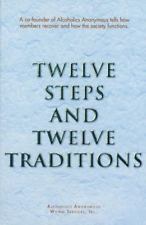
"The only requirement for A.A. membership is a desire to stop drinking."

 |
Tradition Three
"The only requirement for A.A. membership is a desire to stop drinking."
|
 |
By ignoring considerations other than drinking, this Tradition helps reinforce the primary purpose in Tradition Five of carrying the message of recovery from alcoholism. It also upholds the assurance made to readers of A Vision For You, which states: "No one is too discredited or has sunk too low to be welcomed cordially--if he means business. Social distinctions, petty rivalries and jealousies--these are laughed out of countenance." (Page 161)
The reasoning behind this Tradition is stated plainly: "Who dared to be judge, jury, and executioner of his own sick brother?" - a brother who would surely die from this disease if not allowed a chance to recover.
Two examples are given from early AA history. One involves a problem drinker who also suffered from an "addiction even worse stigmatized than alcoholism." 'Sex addict' was a 1930's term for being gay and was, of course, very much looked down upon at the time. The man was allowed in the group, presented no difficulties for other members, and his efforts led to many others getting sober over the ensuing years. Dr. Bob and the Good Oldtimers, Page 240-241, reveals that this event took place in Akron and that Dr. Bob himself made the decision to admit the man.
The second example appears to refer to the personal Story The Vicious Cycle. A militant atheist and power driver, "Ed" offended other members with both his manner and his beliefs. He remained in the group by citing the idea contained in this Tradition, which was already in the manuscript of the Big Book then being written. (This may, in fact, be the earliest example cited in the literature of the literature being cited!) Not receiving answers to his call for help after a relapse while on the road, he had a spiritual experience and became a respected member of the Fellowship who has also helped many over time.